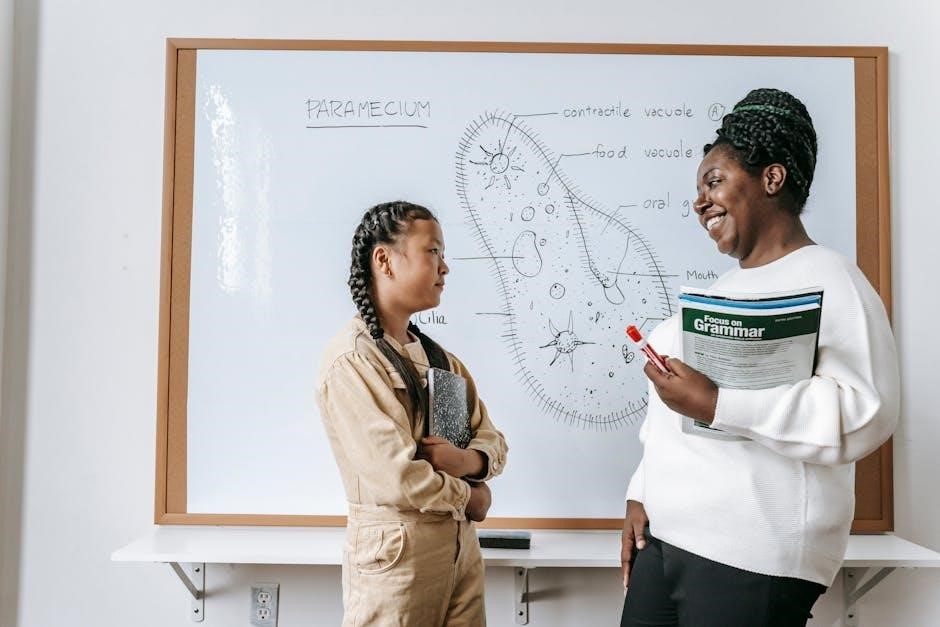the giver discussion guide
Welcome to this comprehensive discussion guide for Lois Lowry’s The Giver․ This guide explores themes, characters, and moral dilemmas, helping readers delve into the novel’s complexities and significance․
Significance of The Giver as a Novel
Lois Lowry’s The Giver is a Newbery Award-winning novel that explores themes of memory, emotion, and conformity in a utopian society․ Its significance lies in its ability to provoke critical thinking about individual freedom versus societal control․ The novel’s dystopian elements and moral dilemmas make it a powerful tool for discussing human rights and the importance of preserving history; Its relatable protagonist, Jonas, and vivid storytelling have made it a staple in educational curricula, sparking debates about conformity and the true cost of “sameness․”
Key Themes and Questions for Discussion
Central themes in The Giver include conformity, memory, and the trade-offs of a utopian society․ Questions for discussion might explore the importance of individuality, the role of memory in shaping identity, and the ethical implications of a society that values sameness above all else․ Readers can also consider Jonas’s journey from innocence to awareness and the moral dilemmas he faces․ These themes encourage reflection on the value of human emotions and the consequences of a society without color, love, or pain;

Jonas as the Receiver of Memory
Jonas’s role as the Receiver of Memory transforms him from an innocent child to a bearer of society’s hidden truths, reshaping his understanding of his world․
The Selection of Jonas and Its Immediate Impact
Jonas’s selection as the Receiver of Memory marks a pivotal moment in his life, separating him from his peers and introducing him to hidden truths․ His new role brings both privilege and isolation, as he begins to experience emotions and memories beyond his community’s controlled existence․ The immediate impact transforms Jonas’s perspective, challenging his understanding of utopia and forcing him to confront the cost of societal “sameness․” This shift lays the groundwork for his journey toward awareness and eventual rebellion․
Jonas’s Emotional and Psychological Struggles
Jonas faces profound emotional and psychological challenges as he receives memories from The Giver․ He struggles with newfound emotions like love, grief, and anger, which contrast sharply with his society’s numbness․ The weight of these memories isolates him, creating internal conflict and confusion․ His growing awareness of his community’s flaws intensifies his anguish, forcing him to question everything he once believed․ This inner turmoil ultimately fuels his desire to protect Gabriel and seek a better future, highlighting his evolving moral courage․
The Role of The Giver in the Story
The Giver serves as the moral and emotional anchor of the narrative, guiding Jonas through his journey․ His wisdom and memories shape Jonas’s understanding of truth․
The Giver as a Mentor and Source of Wisdom
The Giver, as a mentor, imparts wisdom to Jonas by sharing memories of emotions, color, and history․ Through these sessions, Jonas gains insight into the true nature of his society․ The Giver’s patience and depth of knowledge guide Jonas through his emotional and psychological struggles․ Their relationship transforms Jonas from an innocent child to a thoughtful leader․ The Giver’s wisdom helps Jonas understand the cost of utopia, preparing him to make difficult choices․ This mentorship is central to Jonas’s journey and the novel’s themes of memory and freedom․
The Dangerous Relationship Between Jonas and The Giver
The bond between Jonas and The Giver is fraught with danger, as their secret meetings defy societal rules․ The Giver’s transfer of forbidden memories creates a deep emotional connection, making Jonas question the perfection of his community․ Their relationship challenges the society’s control, highlighting the risks of individuality and free thought․ This dangerous dynamic underscores the tension between conformity and rebellion, ultimately leading Jonas to confront the harsh truths of his world and the costs of its “utopia․”

The Society of Sameness
The society in The Giver values conformity, eliminating differences to maintain order․ Emotions, colors, and individuality are suppressed, creating a “utopia” where memories of a diverse past are erased․
Advantages and Disadvantages of a Utopian Society
In The Giver, the utopian society offers stability and equality, eradicating pain and suffering․ Resources are evenly distributed, eliminating poverty and hunger․ However, this comes at a cost: individuality and freedom are suppressed, emotions are numbed, and memories of the past are lost․ The absence of diversity and personal choice leads to a shallow existence, highlighting the trade-off between order and the richness of human experience․ This society underscores the importance of balancing conformity with emotional depth and individuality․
The Ceremony of Twelve and Its Importance
The Ceremony of Twelve marks a pivotal transition in Jonas’s life, symbolizing his entrance into adulthood․ It is a ritual where each Twelve is assigned a life role, dictating their societal contribution․ This event emphasizes conformity and the community’s control over individual destiny․ For Jonas, the ceremony deviates from tradition when he is chosen as the Receiver of Memory, setting him apart and beginning his journey of self-discovery․ This shift underscores the tension between societal expectations and personal identity․

Memory, Emotion, and Color
Memory and emotion are deeply intertwined in The Giver, as Jonas experiences feelings and vibrant colors for the first time, contrasting the society’s dull, emotionless existence․
The Symbolism of Memory and Its Loss
The novel portrays memory as a symbol of humanity and individuality․ Jonas’s acquisition of memories transforms him, revealing the depth of human experience․ The community’s lack of memory symbolizes their loss of identity and emotions․ This contrast underscores the trade-off between utopian stability and personal freedom․ The Giver’s role in preserving memories highlights the importance of history and cultural heritage․ Without memory, society becomes sterile, devoid of love, pain, and true connection․ This theme invites reflection on the value of preserving our collective past․
The Role of Color in the Novel
In The Giver, color symbolizes emotion, memory, and individuality․ Jonas’s world begins in black and white, reflecting the society’s suppression of feelings and diversity․ The apple’s red color represents Jonas’s awakening to true emotions and connections․ As Jonas receives memories, color gradually enters his life, mirroring his growing understanding of the world’s depth․ The absence of color in the community highlights its lack of vibrancy and authentic human experience, while Jonas’s perception of color signifies his journey toward individuality and truth․ This contrast underscores the novel’s themes of conformity and self-discovery․

Family and Relationships
Family structures in The Giver are unconventional, with children assigned to units rather than biological parents․ This system emphasizes unity over individual bonds, creating a society where familial love is suppressed, impacting emotional connections and personal identity․ Relationships are dictated by rules, limiting genuine emotional depth, and highlighting the trade-offs of a “utopian” society․
The Family Unit in Jonas’s Community
In Jonas’s society, families are structured without biological ties․ Children are assigned to family units, fostering a sense of unity but lacking genuine emotional bonds․ Parents are referred to as “Nurturers,” roles focused on care rather than personal connection․ This system prioritizes sameness and efficiency, suppressing individuality and deep familial relationships․ The absence of biological parents distances Jonas from traditional family dynamics, emphasizing the community’s value on conformity over personal attachment․ This structure shapes Jonas’s understanding of family and influences his eventual quest for truth․
The Role of Gabriel in the Story
Gabriel, the vulnerable infant, plays a pivotal role in Jonas’s journey․ His presence sparks Jonas’s emotional awakening and connection to humanity․ Gabriel’s uniqueness—he is “different” and struggles to thrive—challenges the society’s perfection ideals․ Jonas’s bond with Gabriel deepens his understanding of love and individuality, ultimately motivating his rebellion․ Gabriel’s fate symbolizes the risks of a society that values sameness over human life, making him a critical catalyst for Jonas’s actions and the story’s climax․ His character embodies hope and the power of human connection․
The Ending of The Giver
The novel concludes with Jonas and Gabriel escaping their society, seeking a future filled with hope and freedom․ The ending is intentionally ambiguous․
Interpretations of the Ambiguous Ending
The ending of The Giver sparks intense debate․ Some interpret Jonas and Gabriel’s journey as a hopeful escape to a better society․ Others view it as tragic, suggesting they may not survive․ The ambiguity allows readers to reflect on themes of freedom and sacrifice․ Many believe the ending emphasizes the importance of memory and emotion in creating a meaningful future․ The open conclusion challenges readers to consider the true cost of utopia and the value of individuality․
Writing Your Own Ending
Writing your own ending for The Giver invites creative exploration of Jonas’s fate․ Readers can imagine a utopian society where Jonas and Gabriel find freedom, or a dystopian reality where they face new challenges․ Some envision Jonas returning to his community to inspire change, while others see him discovering a world beyond the familiar․ This exercise encourages reflection on the novel’s themes of memory, love, and sacrifice, allowing readers to craft a conclusion that aligns with their interpretation of Jonas’s journey․
